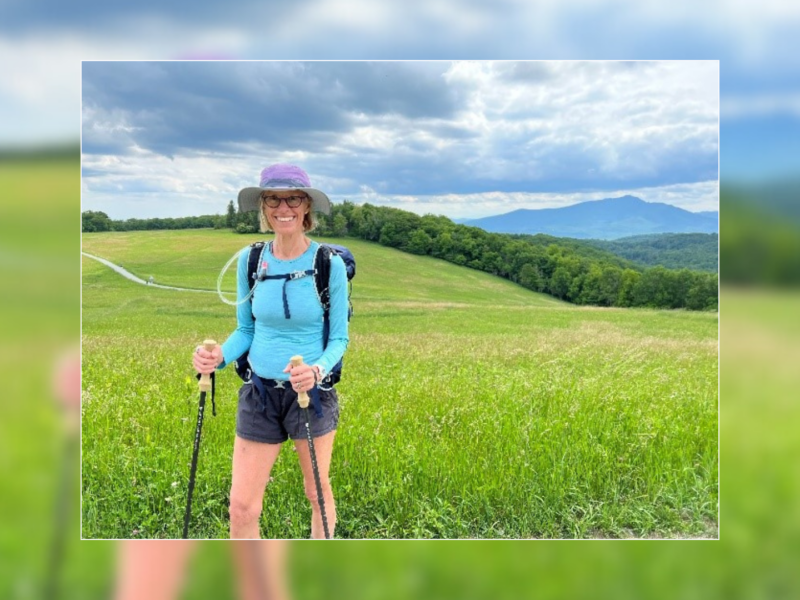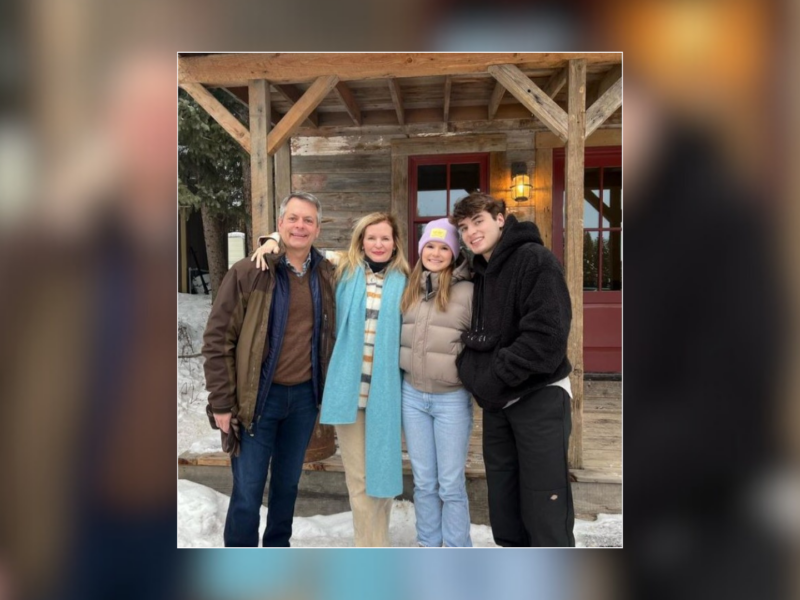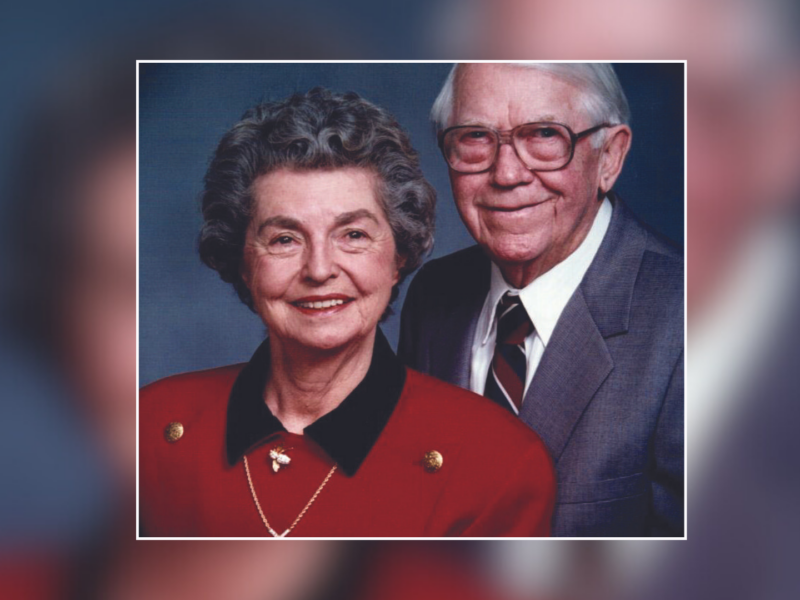
From ‘Some Dude’ to Someone Advocating for Housing
How Winston Robinson turned parties into a movement to increase homeownership among Black Charlotteans
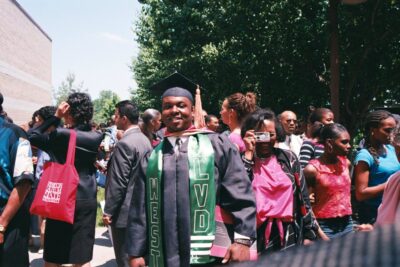
Robinson graduated from Myers Park High School before heading to Winston-Salem State University.
As both a parent and a community organizer, Winston Robinson subscribes to the philosophy that a little sweet helps us deal with the sour. He founded the nonprofit Applesauce Group on that principle. The name comes from an old parenting trick of masking the taste of medicine by hiding it in applesauce.
In Robinson’s world, reliable, easy-to-digest information on homeownership is the medicine. And a big bash is the applesauce disguising it.
Robinson throws parties that have a purpose. But before these events had a “medicinal” component, they were just parties.
Robinson graduated from Myers Park High School before heading to Winston-Salem State University, where he graduated in 2004 – “when phones still flipped,” he said.
He and several friends moved to Charlotte after graduation. And they said farewell to their first post-college summer with a big cookout at a shelter they rented at Sugaw Creek Park. The event was successful, and they decided to hold it yearly. It grew exponentially until 2015 when Robinson learned his group wasn’t allowed back.
Being Black in America, Robinson wondered if race led to his expulsion. Instead, he was a victim of his group’s success. He hadn’t been aware that all the would-be revelers attempting to reach the 2014 cookout created a traffic nightmare near the Sugar Creek exit off I-85.
Everyone wants to be at Robinson’s parties.
From ‘Some Dude’ to Homeownership Advocate
Robinson and his older sister grew up in historic Wilmore. He’s so inextricably linked to the neighborhood of his youth that the nickname he acquired in college (“Wilmo”) is an homage to his old stomping grounds.
His parents bought their home about a decade after the 1968 passage of the Fair Housing Act, which prohibited housing discrimination based on race, religion, national origin and gender.
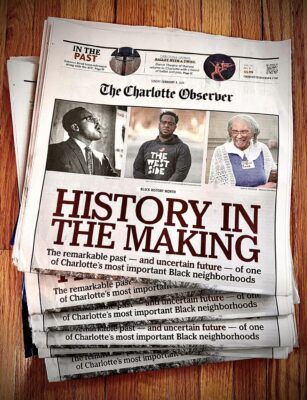
Robinson has been instrumental on spreading the news about his West Charlotte neighborhood.
As Black families moved to Wilmore, white families moved out. Soon, I-77 would take shape near uptown and its adjacent neighborhoods. Robinson said many white families chose to sell rather than live close to a major interstate.
Robinson came of age during what he called “the crack cocaine era and the beginning of the prison-industrial complex and mass incarceration of Black men.”
Still, his childhood was idyllic. “You’d never believe how beautiful my childhood was if all you knew about my neighborhood was what you read in the newspaper or saw on TV,” he said.
By 2015, Robinson – one of QCity Metro’s 2023 “Great 28: Black Charlotteans Who are Shaping our City” – was married to Quiana and the couple was about to buy their first house.
They bought in Lockwood, just north of uptown and across from Camp North End. Quiana encouraged her husband to get involved in their new neighborhood. “I think she was just trying to get some alone time,” Robinson quipped.
The first neighborhood meeting he attended changed his life. “I’m telling you,” he said, “Black elders can make you feel confident, capable, strong and smart. Before I left that meeting, I’d been named vice president (and, a few weeks later, president) of the neighborhood association. And it was the single hardest thing I’d ever done.”
He soon learned that Realtor.com had declared Lockwood the third-fastest gentrifying neighborhood in the country. The national media started calling. “I didn’t have a planning background,” he said. “I’m just some dude. My new neighborhood was reflective of a national trend. People who’d lived in Lockwood for 50 and 60 years had been underserved, undervalued and marginalized.”
And now that their neighborhood was suddenly hot, they were being displaced.
A Dream Takes Shape
Robinson wanted to understand why homeownership eludes so many Black families. He found answers in Richard Rothstein’s The Color of Law: A Forgotten History of How Our Government Segregated America, and a book-length article in The Atlantic – “The Case for Reparations” by Ta-Nehisi Coates.
What he read infuriated him. Racism – responsible for so many societal ills – had also impacted Black homeownership.
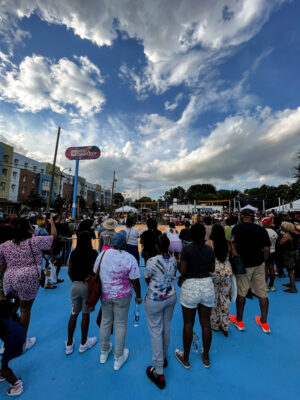
Robinson has combined his knack for throwing a great party with his advocacy for home ownership.
“Homeownership is the cornerstone of the American dream,” Robinson said. “And yet the wealth gap has made homeownership out of reach for many people of color. When you’re Black in America, you can convince yourself of your own inadequacy. I wanted to get on the soapbox and yell to anyone who’d listen: ‘This is not your fault. This is bigger than you.’
“I thought if people just had the right information, they could begin that journey to the American dream.”
While investors were gobbling up properties in Lockwood, Camp North End – right across the street – was taking off. Camp North End’s community manager invited Robinson to start his cookouts again and hold them in Camp North End’s Boiler Yard.
Robinson wasn’t the same person he’d been as a recent college graduate. He wasn’t excited about hosting yet another party. Now, he had financial literacy resources and contacts in the industry.
He’d recently invited DreamKey Partners – formerly the Charlotte-Mecklenburg Housing Partnership – to give a presentation in Lockwood on what it takes to buy a home. He saw the interest was there.
He had a proven track record for bringing people together for a good time. What if he used the applesauce trick to educate those partygoers on homeownership? Guests could have a good time and learn something.
He branded the 2017 event “A Vibe Called Fresh.” And just as his initial, post-college cookouts caught on, so did the 2.0 version. After that inaugural event, 47 partygoers began the process of becoming first-time homebuyers.
Opening the Door to Opportunity
Robinson’s events remind Sherri Chisholm of a family reunion. But the executive director of Leading on Opportunity sees something more poignant at play. “Historically, African Americans haven’t always had access to resources,” she said. “Yet we’ve always found ways to be joyful.”
Robinson’s events are so festive that guests may not even realize they’re learning something while there – something he refers to as “enjoyable empowerment.” He won’t force education on anyone. But he’s adamant about making it available.
When Chisholm moved here from Detroit three years ago, she heard she had to meet Robinson. She was looking for someone familiar with Charlotte’s west side to serve on the Leading on Opportunity council. (An initiative housed at Foundation For The Carolinas, Leading on Opportunity works to improve economic mobility for underserved populations.)
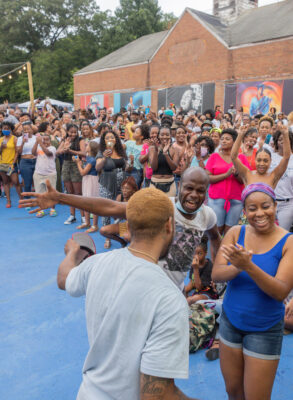
Robinson has combined his knack for throwing a great party with his advocacy for home ownership.
The more Chisholm learned about Robinson, the surer she was the council needed him. He’s the youngest person on the leadership team for the Sarah Stevenson Tuesday Forum led by Black elders, which she called “a signal that people trust him.”
Robinson didn’t say an immediate “yes.” In fact, he said “no.” Twice. Chisholm was undeterred.
“Winston had a lot of questions for me, as he should,” she said. “I told him my story, and he shared his. We discovered a lot of commonalities. We both want to make change in our community. We’re both the parents of young children. And we both have hope for the future.”
Eventually, she won him over.
“Her unwavering passion, optimism, commitment, confidence and sense of duty to tackle such monumental tasks, even as a new mother, left an indelible impression on me,” he said. “In her, I saw true leadership.”
She saw the same in her new recruit. “We wanted the power of Winston’s voice in the room,” she said. Chisholm relies on Robinson to bring up what she called “uncomfortable, but necessary, questions. Winston asks the questions everyone else is thinking – or should be thinking, anyway.”
He speaks for people who haven’t always had a voice – the people who, he said, “navigate the harsh realities of a world intentionally designed to marginalize them. I intimately understand their frustrations, their sense of hopelessness, their righteous anger and their unyielding fatigue.”
Just as his parties have a purpose, his service on this board does, too. He’s there to “advocate for those whose voices often go unheard, to challenge systems of oppression and anti-Blackness and to fight for a more just and equitable society.”
The Man Meets the Moment
The success of Robinson’s Vibe events (in addition to A Vibe Called Fresh, there’s also A Vibe Outside) led him to create Applesauce Group, a nonprofit that organizes free community events with a higher purpose. But working to combat decades of economic inequality is a monumental task.
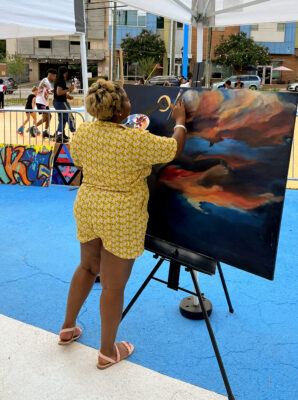
Robinson’s parties feature music, art and more.
And Robinson had a thriving career in experiential marketing.
He was also drained from the travel and missing his family while he was on the road. The pandemic lockdown forced a period of introspection on the marketing mogul. He realized he was being called to a ministry of sorts.
With a “newfound sense of purpose and the unwavering support of my wife … I found the courage to take the leap into the unknown.”
He knew it wouldn’t be easy, and it hasn’t been. He’s not making a salary yet and has no paid staff, but consulting gigs stemming from his marketing career are providing income for now.
And Applesauce has the support of some powerful locals. Robinson cites Charles Thomas of the Knight Foundation, Rodrick Banks of Wells Fargo, Julie Porter of DreamKey Partners, Liz Holmes-Baxter of Credit Karma and Brittany Hillman of Bank of America as key supporters.
‘More Math Than Magic’
In 2017, Robinson’s growing family – which today includes two sons, ages 6 and 20 months – needed a bigger house. They found it in McCrorey Heights, a neighborhood he said is “steeped in rich history and cultural significance.”
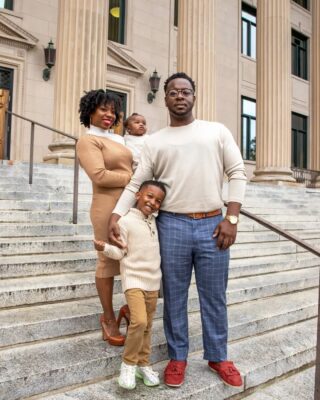
Robinson’s family now includes his wife Quiana and his two sons, ages 6 and 20 months.
It felt like destiny. As a kid, Robinson and his family would drive through the neighborhood on Sundays after church. “Living in McCrorey Heights had always been a dream of mine,” he said. “Raising my two sons here has been nothing short of transformative.” And that’s despite it still being “overlooked in Charlotte’s broader narrative of embracing the ‘new and shiny.’”
And true to form, he’s gotten involved. He serves on the McCrorey Heights Neighborhood Association, in addition to other civic commitments such as serving on DreamKey Partners’ board.
For Chisholm, Robinson is ideally suited to any task he focuses on: “This is only the beginning for Winston. We can’t even imagine all he’ll accomplish in the years ahead.”
In everything he does, Robinson tries to uplift Black Charlotteans. And he has an answer for those who say the task is too big and complex. It comes down to resource allocation.
“It’s not an enigma; it’s a matter of priorities and accountability,” he said. “Until we collectively embrace the responsibility to rectify these disparities … genuine progress will remain elusive. We cannot fix it, if we’re reluctant to even talk about it.”
To ensure equal opportunity for all, we need to “recalibrate our societal calculus,” he said. “True change, as I see it, is more math than magic.”
Learn more at applesaucegroup.org. or on Instagram at @avibecalledfreshclt. And make plans to attend the group’s next event. “It promises to be an unforgettable experience,” Robinson said. “Get ready for the time of your life!”


